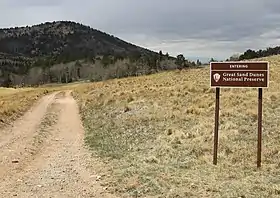Mosca Pass
Mosca Pass, elevation 9,714 feet (2,961 meters), is a mountain pass in Alamosa and Huerfano counties in the Sangre de Cristo Range in southern Colorado. The pass lies on the eastern border of the Great Sand Dunes National Park and Preserve about 40 miles west of Walsenburg, Colorado. It marks the boundary between the Great Sand Dunes National Preserve to the west and San Isabel National Forest to the east, and it also lies on the border between Alamosa and Huerfano counties.
| Mosca Pass | |
|---|---|
 Looking west from the top of the pass | |
| Elevation | 9,714 ft (2,961 m)[1] |
| Traversed by | trail |
| Location | Alamosa / Huerfano counties, Colorado, U.S. |
| Range | Sangre de Cristo Range |
| Coordinates | 37°43′58″N 105°27′16″W |
| Topo map | USGS Mosca Pass |
Mosca Pass Trail, which starts near the Great Sand Dunes National Park visitor center and is impassable to vehicles, lies on the west side of the pass, and Forest Road 580[2] begins and heads east from the top of the pass, becoming County Road 580 after passing the national forest boundary. The terrain is a mix of montane meadows, ponderosa pine woodlands, and Douglas-fir forest.[3]
The pass was previously traversed by the former Colorado State Highway 150.[4]
Mosca Pass was named[5] for Luis de Moscoso Alvarado, whose scouting parties may have reached this area about 1542.[6]
References
- "Mosca Pass". Geographic Names Information System. United States Geological Survey, United States Department of the Interior. Retrieved 2014-08-21.
- "Great Sand Dunes National Park, Colorado". MagazineUSA.com. 2007-05-04. Retrieved 2018-05-05.
[Mosca Pass Trail] continues through a series of open meadows ringed by forest rising to Mosca Pass. The trail ends at Mosca Pass, where it meets US Forest Road #583.
- "USDA Forest Service, San Isabel National Forest, Mosca Pass". Retrieved 2014-08-21.
- Salek, Matthew E. "Colorado Routes 140-159". Retrieved 2014-08-21.
- "Alamosa Communities". Sangre de Cristo National Heritage Area. Archived from the original on 2014-08-19.
- Ferril, William (1911). Sketches of Colorado: being an analytical summary and biographical history of the State of Colorado as portrayed in the lives of the pioneers, the founders, the builders, the statesmen, and the prominent and progressive citizens who helped in the development and history making of Colorado, Volume 1. Western Press Bureau Co. p. 10. Retrieved 2014-08-21.